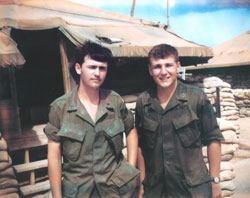 Here is an account of Chuck Hagel's time in Vietnam:
Here is an account of Chuck Hagel's time in Vietnam:This account is from the New York Times Magazine article The Heartland Dissident.When his number came up at the draft board in January 1967, he went willingly. And when, after training, he received orders to go to Germany, he requested a transfer to Vietnam. He hadn't been touched by anti-war protests. Where he came from, the feeling was that if there was a war on, that's where a young American soldier belonged. In that reflex, which many would still call patriotic, he briefly found a purpose.
It's unclear to the two brothers today how they wound up in the same infantry squad. Tom, drafted as soon as he finished high school, went initially to a reconnaissance unit up north, where he saw heavy fighting. He put in for a transfer, hoping to get closer to his brother, who was serving in the south. Soon they were on patrol together in canopied jungle near the Cambodian border. Over a period of about four weeks, each got a chance to save the other's life. When the first incident occurred, on March 28, 1968, their squad leader had just taken them off point and moved them to the middle of the column. One of the soldiers who replaced them hit a trip wire, setting off a mine that had been placed in a tree so that it would detonate at face level. Bodies, body parts and shrapnel were blasted back into the ranks as the squad was crossing a stream. Tom picked himself up and looked for his brother. What he saw, he says, was a "geyser" of blood gushing from Chuck's chest. Tom, then only 19, stanched the bleeding and bandaged the wound, only then noticing that he'd been hit himself in the arm. By the time the medevac choppers had taken off the dead and critically wounded, the Hagel boys were deemed well enough to continue on, which meant going off the booby-trapped trail and hacking through thick undergrowth.
Twenty-five days later, it was Chuck's turn to rescue Tom, when their troop carrier hit a hand-detonated mine as it emerged from a village in the delta. Tom had been in the turret behind a .50-caliber machine gun. He was unconscious, not obviously alive, when his brother got to him. The blast had blown out Chuck's eardrums and severely burned his left side, but knowing the carrier might soon explode, he worked feverishly to pull Tom from the wreckage, then threw his body on top of Tom's as Vietcong fighters in ambush sprayed the area with gunfire.
Chuck left Vietnam in December 1968, Tom the following February. Back in Omaha, they roomed together for a time, then followed separate paths to readjustment to civilian life. Beset by nightmares and feelings of guilt that sent him off on binges, Tom had the most to get over, what seemed to be the harder time. He also had the clearest idea about the war, which seemed to him futile and cruel. Before they could get used to their new lives, their youngest brother, Jimmy, was killed in a car crash at 16, yet another piece of Hagel hard luck.
Technorati tags: Senator Chuck Hagel, Vietnam


1 comment:
Senator Hagel's life has not been an easy one. If anyone ever read Lou Cannon's account of Reagan's presidency, he has a whole chapter that addresses some of the deeper psychological issues that Reagan faced as the child of an alcoholic parent. Senator Hagel has done well for himself in the face of personal adversity, family loss, war, etc. He is truer to the GOP ideal of the self-made man than most GOP presidential nominees. He is no scion.
Thanks for the link to my site; hopefully I will get to writing again...soon.
Post a Comment